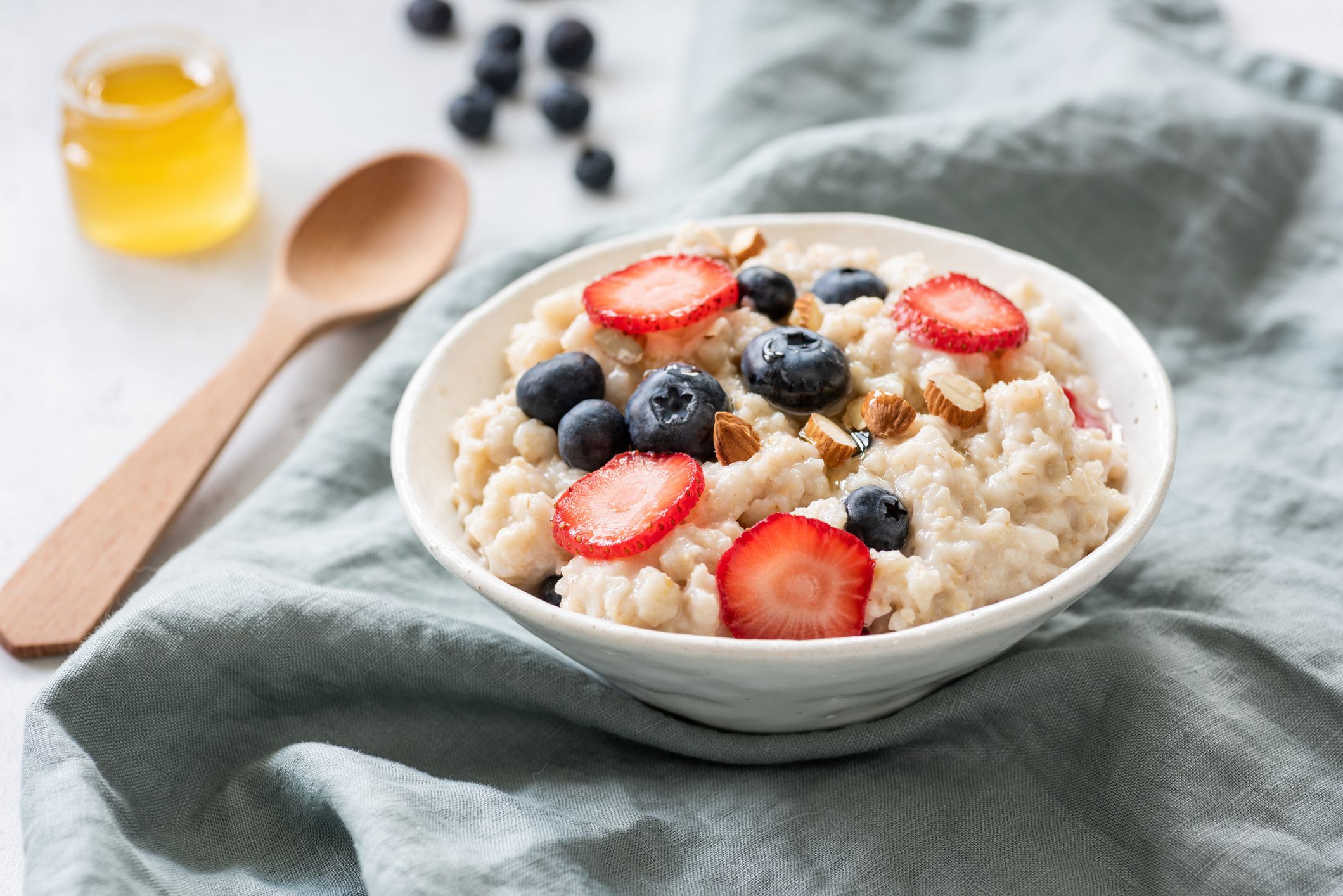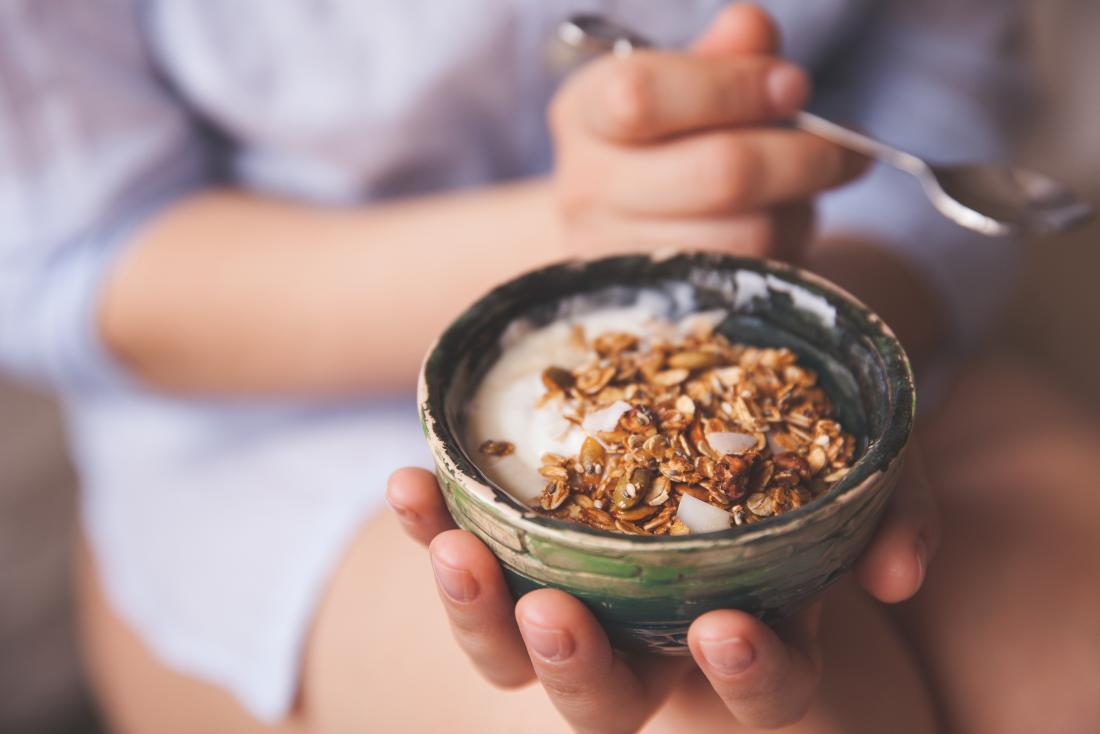Looking to lose weight? Starting your day with oatmeal could be the secret. It’s not just tasty; it’s also full of things that help you feel full, give you energy, and don’t make you gain weight. This article will talk about why oatmeal is a good choice if you’re trying to lose weight. We’ll show you how it keeps you full, why it’s so good for you, and how it can fit into your weight loss plan. So, grab your spoon, and let’s find out how a simple bowl of oatmeal can be a big help on your weight loss journey.

Contents
Is Oatmeal Good For Weight Loss?
Yes, oatmeal is beneficial for weight loss for various reasons. Let’s explore each reason in detail:
1. High in Fiber:
Oatmeal is packed with soluble fiber, particularly beta-glucan, which absorbs water and expands in your stomach, helping you feel full for longer periods. This natural appetite suppressant reduces the likelihood of overeating and snacking, aiding in weight management. High fiber intake also improves bowel movements, contributing to a healthier digestive system, which is crucial for effective weight loss.
2. Low in Calories:
A serving of oatmeal is relatively low in calories while being very filling, making it a great option for those on a calorie-restricted diet. By starting your day with a bowl of oatmeal, you can keep your calorie count in check, facilitating a calorie deficit, which is essential for weight loss. It’s a nutrient-dense option that provides essential vitamins and minerals without the high-calorie count found in other breakfast foods.
3. Helps Control Blood Sugar Levels:
The soluble fiber in oatmeal can help control blood sugar levels by slowing the absorption of sugar into the bloodstream. This slow absorption prevents sudden spikes in blood sugar and insulin levels, which can lead to cravings and overeating. By maintaining stable blood sugar levels, oatmeal can help manage hunger and reduce the risk of insulin resistance, which is often associated with weight gain.
4. Increases Satiety:
Oatmeal has a high satiety index, meaning it can keep you feeling satisfied longer than many other foods. This is due to its high fiber content and the presence of complex carbohydrates, which take longer to digest. Feeling full and satisfied can prevent unnecessary snacking and overeating, which is crucial for maintaining a healthy weight or losing weight.
5. Supports Healthy Digestion:
The fiber in oatmeal not only aids in feeling full but also supports healthy digestion by helping to regulate bowel movements. A healthy digestive system is vital for effective weight loss, as it helps to ensure that food is efficiently processed and nutrients are optimally absorbed. Regular bowel movements can also prevent bloating and discomfort, contributing to a more effective weight management strategy.
6. Provides Essential Nutrients:
Oatmeal is a good source of essential nutrients, including vitamins, minerals, and antioxidants, which are important for overall health and can support weight loss efforts. Nutrients such as magnesium, phosphorus, zinc, and iron in oatmeal play a role in energy metabolism, muscle function, and the immune response, helping you to stay active and healthy.
7. Offers Versatility:
Oatmeal’s versatility makes it easy to incorporate into a weight-loss diet without becoming monotonous. You can prepare it in various ways and pair it with numerous healthy toppings like fruits, nuts, and seeds, which can add extra nutrients and flavors without significantly increasing the calorie content. This variety can help you stick to your diet and enjoy your meals.
8. Boosts Energy Levels:
The complex carbohydrates in oatmeal provide a steady source of energy, which is essential for maintaining physical activity levels. Regular physical activity is crucial for burning calories and building muscle, both of which are important for weight loss. By providing a sustained energy release, oatmeal helps you stay active and engaged in your exercise routine.
9. Lowers Cholesterol:
Oatmeal can help lower bad LDL cholesterol without affecting good HDL cholesterol, thanks to its beta-glucan content. High cholesterol levels are often associated with increased body weight and obesity-related diseases. By improving cholesterol levels, oatmeal supports heart health and may indirectly facilitate weight loss by promoting overall well-being.
10. Can Be Part of a Balanced Diet:
Incorporating oatmeal into a balanced diet can help you reach and maintain a healthy weight. Oatmeal complements fruits, vegetables, lean proteins, and healthy fats, allowing for a balanced intake of macronutrients. This balance is crucial for weight loss, as it ensures that you’re getting all the necessary nutrients for optimal health while managing your calorie intake.
What is the healthiest way to eat oatmeal?
To enjoy oatmeal in the healthiest way possible, follow these guidelines, outlined in concise points:

-
Choose Whole or Steel-Cut Oats: These retain more nutrients and fiber than instant varieties, offering better health benefits and a lower glycemic index.
-
Limit Added Sugars: Avoid using refined sugars. Opt for natural sources of sweetness like fruits, or use a small amount of honey or maple syrup if necessary.
-
Incorporate Protein: Add a scoop of protein powder, nut butter, or Greek yogurt to your oatmeal to make it more filling and to boost your protein intake.
-
Use Healthy Fats: Include nuts or seeds (almonds, chia, flaxseeds) to add omega-3 fatty acids and healthy fats, enhancing satiety and flavor.
-
Cook with Water or Milk Alternatives: Prepare your oatmeal with water or unsweetened almond, soy, or oat milk to keep calories in check.
-
Add Fruits for Sweetness: Top your oatmeal with fresh or frozen berries, banana slices, or apple chunks for natural sweetness, vitamins, and fiber.
-
Flavor with Spices: Use cinnamon, nutmeg, or vanilla extract for rich flavor without added sugar or calories.
-
Avoid High-Calorie Toppings: Stay clear of heavy cream, sweetened dried fruits, or large amounts of high-calorie toppings.
-
Balance Your Meal: Aim for a balance of carbohydrates, protein, and healthy fats within your oatmeal to ensure a well-rounded and nutritious meal.
-
Watch Portion Sizes: Even healthy oatmeal can contribute to weight gain if eaten in large quantities. Stick to a reasonable serving size, typically about half a cup of dry oats.
-
Experiment with Savory Flavors: For a twist, try savory oatmeal with ingredients like avocado, spinach, or eggs, to avoid added sugars altogether.
-
Stay Hydrated: Pair your oatmeal with a glass of water or herbal tea for a hydrating and satisfying breakfast or meal.
Frequently Asked Questions
Does the 7-day oatmeal diet work?
No, the oatmeal diet is a highly unbalanced approach to nutrition and potentially harmful to a person’s health. It promises fast weight loss but does not ensure safety. No research supports its use.
Is Quaker oats oatmeal good for weight loss?
Yes, studies show that oats and oatmeal have many health benefits, including weight loss, lower blood sugar levels, and reduced risk of heart disease. Quaker oats are a good choice for weight loss.
What are the pros and cons of eating oatmeal?
Oats are a low-risk, high-reward food. They are high in soluble fiber, which aids digestion, but some people may experience bloating increased gas, and abdominal cramps.

Hello, I’m Ravindra. Over the years, I’ve immersed myself deeply into the world of fitness and health, transforming both my body and mind. Writing has allowed me to share my journey, insights, and expertise with those just starting out and seasoned fitness enthusiasts alike. Beyond just routines and diets, I believe in inspiring others to adopt a holistic approach to well-being.
